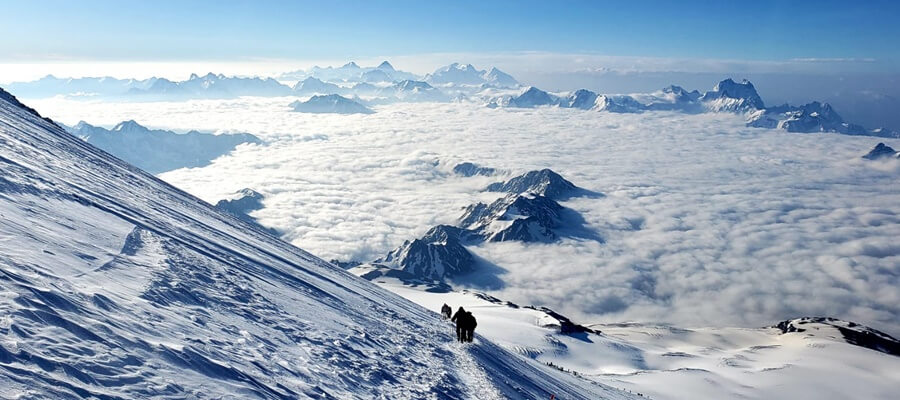Within the international climbing community, Mt. Elbrus is well-known as Europe’s highest peak, or one of the 7 Summits. But how well-known is it outside of the climbing community? In my experience, not very! There are actually lots of interesting historical and cultural tidbits about Mt. Elbrus that touch many facets of life you may already be familiar with. It’s more than just a mountain to climb! Enjoy this article about Mt. Elbrus, for climbers and non-climbers alike!
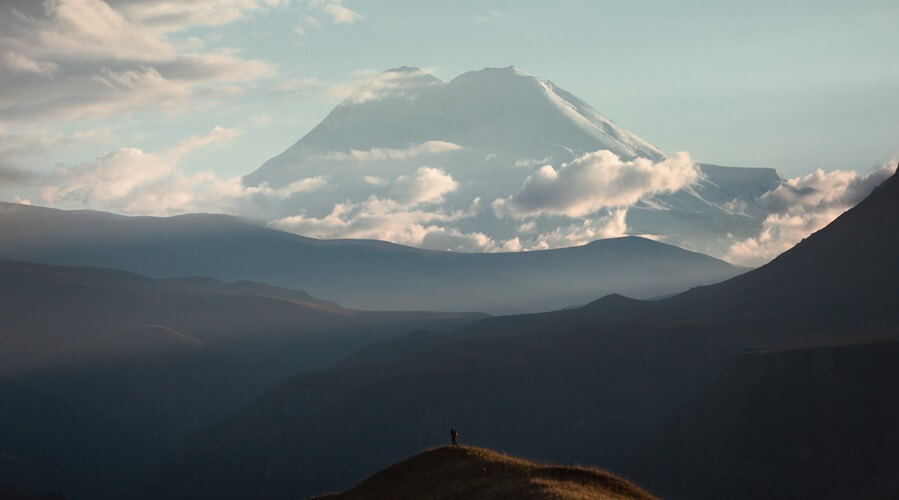
1) Highest Peak in Europe – Mt. Elbrus IS the highest peak in Europe at 5,642 meters (18,510 feet) above sea level. Despite the occasional objection, this is pretty undisputed around the world. Arguments you may hear contrary to this:
-Mont Blanc (France) is the highest mountain in Europe. False. Mont Blanc is the highest mountain in the European Union, but the 7th highest mountain in all of Europe.
-Russia is not in Europe. False. Because Russia is the world’s largest country spanning from the Baltic Sea to the Pacific Ocean, this can be confusing. Some people may say that Western Russia is a part of Europe and eastern Russia is a part of Asia (with the Ural Mountains as the dividing line), but Russia is universally accepted by geographers today as a part of the continent Europe.
-Mt. Elbrus is not a mountain. This is technically true, it is an inactive volcano, that last erupted approx. 2,000 years ago. That’s why we call it Europe’s highest summit, or peak. 🙂
2) What’s in a name? Elbrus is a male name in the Caucasus Mountain region! That’s right, imagine the pressure that comes with living up to a name of that strength and magnitude! In the local Karachay-Balkar language where Mt. Elbrus resides, Elbrus means “Resembling a Thousand Mountains”, or Mingi-Tau.
3) Mountain in Mythology – Mt. Elbrus has strong connections with Greek and Iranian mythology. That’s right, in a story that you may not want to pass on to your children, Zeus chained Prometheus to Mt. Elbrus (called Strobilus in the original story) as punishment for stealing fire from Zeus, and sharing it with mankind. Zeus sent an eagle to eat Prometheus’s liver, and Heracles intervened to save Prometheus. Wow! The roots of the name “Elbrus” come from a mountain in Iranian mythology called “Alborz” in Persian, which eventually was used to describe the Caucasus Mountains’ highest peak.
4) Alps or Caucasus? The Alps are NOT Europe’s highest mountain range. That’s right, it’s the Caucasus Mountains that lay claim to 7 of Europe’s 10 highest peaks! While Mont Blanc (#7), Monte Rosa (#9), Matterhorn and Eiger (not on the list!) in the French and Swiss Alps may be more well-known, the Caucasus Mountain range is home to the 6 highest peaks in Europe, three of them in Georgia (Mt. Kazbek the most well-known at #5, 16,558 ft. (5,047 m), and three in Russia, with Mt. Elbrus coming in as the highest peak. Georgia in the South Caucasus is growing in popularity as a climbing destination (Kazbek) and ski destination (Gudauri and Svaneti).
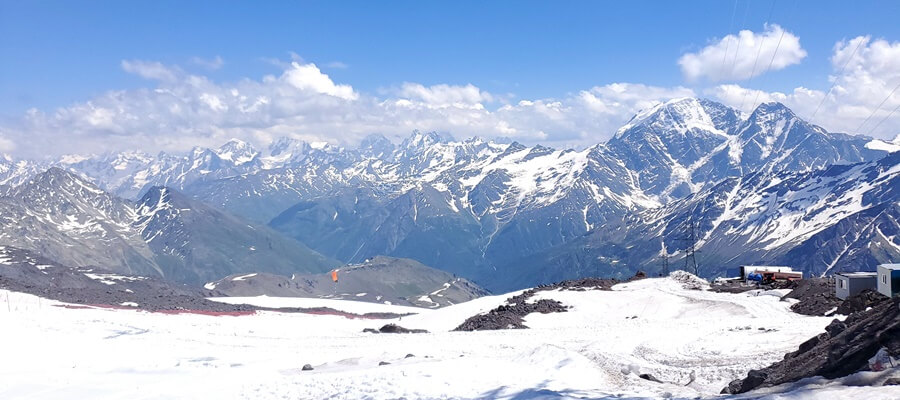
5) Climbed for more than 150 years! The first recorded summits of Mt. Elbrus were in the 19th century. Historians recognize the following as the first two successful summit attempts:
-1829 – Local Khillar Khachirov (Kabardian nationality) climbed to the lower eastern peak.
-1874 – Local Akhiev Sataev (Balkar nationality) led the first European expedition to the higher western peak, co-led by British explorer F. Crauford Grove and Swiss explorer Peter Knubel
6) Skier’s Delight! Mt. Elbrus is one of Russia’s top ski resorts from December – April! While Sochi is better known on the international scene because of the 2014 Winter Olympics, many Russians flock to Elbrus every winter to ski its majestic slopes from 12,500 ft. (3,800 m) downward! Elbrus also has a neighboring mountain Cheget that offers some of the best off-piste skiing in the country. This explains the ski lifts that climbers ride up from the bottom of the mountain to base camp as a part of their acclimatization, instead of making the hike by foot. For more extreme climbers/skiers, April-May is ski mountaineering season at Elbrus, i.e. climbers summit Mt. Elbrus on skis and then ski the 5,000 ft. back to base camp. Not for the faint of heart!
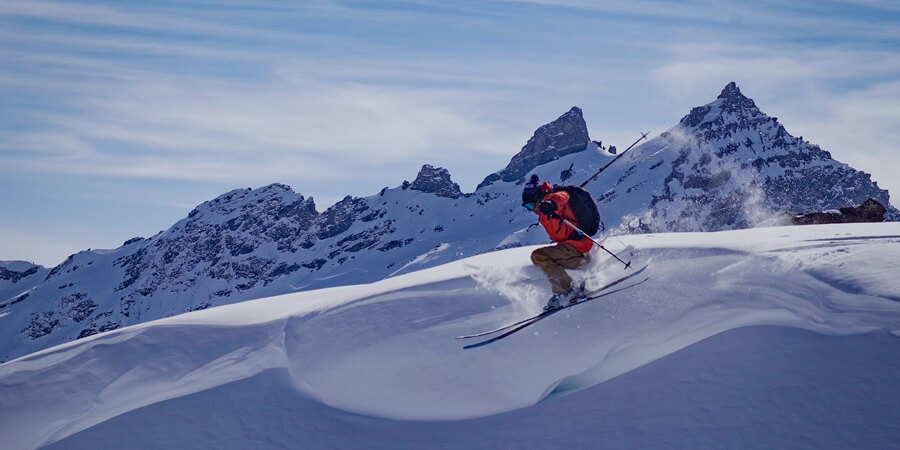
7) WWII at Elbrus! Mt. Elbrus was under Nazi control for 6 months in 1942-1943 during World War II! Nazi forces pressed deep into southern Russia and the Caucasus Mountains but were eventually pushed back by Soviet forces. Several battles took place on Mt. Elbrus itself. A group of Nazi soldiers actually summited Mt. Elbrus in Aug. 1942 for propaganda purposes back home. There is a War Memorial and small museum on the 2nd ski-lift level (Mir) of Elbrus if you have time to pay your respects and learn more about this part of Russian history.
8) Guinness World Book of Records! Mt. Elbrus is the highest point in the world a vehicle has ever accessed! In 1997, Russian explorer Alexander Abramov led a team of explorers driving a Land Rover to the summit that took 43 days total! The final stretch (that climbers attempt on summit day) took the majority of the journey because of the severe conditions and high altitude literally breaking the car apart, and the team needing to constantly descend the mountain for extra parts! The vehicle was more or less pulled by tire chains and winches the final several thousand feet of the summit. After celebrating their ascent, one of the team members apparently attempted to drive the vehicle down the mountain, which resulted in it careening down the side of the mountain, where many of its parts are still buried in the snow today (the driver ejected safely).
9) Live in Luxury – You can live in relative luxury at base camp! Elbrus is famous for its “barrel huts” at base camp, the original oil containers where climbers spend several days acclimatizing for their summit attempt. Now there are a plethora of shipping containers, shelters, and other living arrangements available for different cost and comfort preferences, the best of which being Leaprus Barrel Huts.
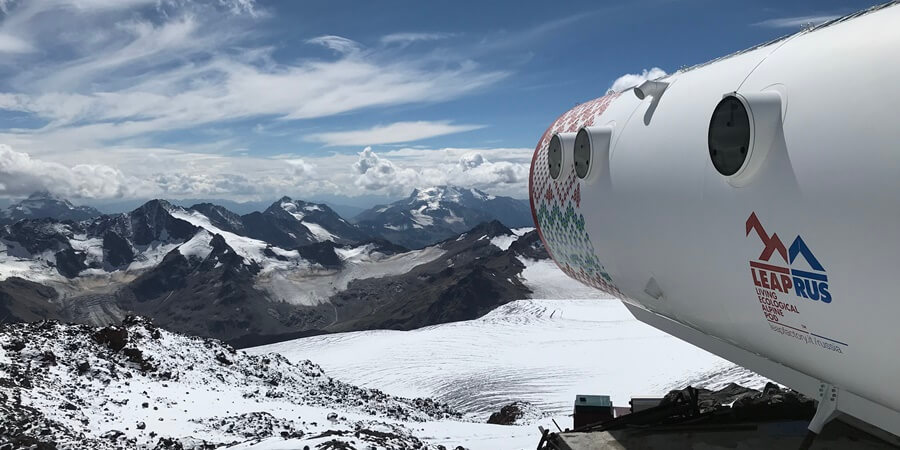
Leaprus has actually been featured as a top glamping destination in the world, with its working wifi, indoor plumbing, and nice dining set-up. Although luxury is relative at 13,000 ft. (3,912 m), Leaprus is about as 5-star as it gets at base camps around the world!
10) Waxing Eloquently about Elbrus – Mt. Elbrus and the Caucasus Mountains feature prominently in Russian poems of the 19th century, including multiple references by famous poets by Evgeny Pushkin and Mikhail Lermontov. Below is a poem about the beautiful Caucasus Mountain range by Pushkin, written from the perspective of Mt. Elbrus itself:
The Caucasus lies before my feet! I stand where
Glaciers gleam, beside a precipice rock-ribbed;
An eagle that has soared from off some distant cliff,
Lawless as I, sweeps through the radiant air!
Here I see streams at their sources up-welling,
The grim avalanches unrolling and swelling!
The soft cloudy convoys are stretched forth below,
Tattered by thronging mad torrents descending;
Beneath them the naked rocks downward are bending,
Still deeper, the wild shrubs and sparse herbage grow;
But yonder the forests stand verdant in flora
And birds are a’twitter in choiring chorus.
Yonder, cliff-nested-are dwellings of mortals,
There pasture the lambs in sweet blossoming meadows–
There couch the herds in the cool deepening shadows–
There roar the Aragua’s (river) blue sparkling waters,
And lurks the bandit safe hid in lone caverns,
Where Terek (river), wild sporting, is cutting the azure!
It leaps and it howls like some ravening beast
At first sight of feeding, through grating of iron–
It roars on the shore with a furious purring,
It licks on the pebbles with eagerest greed.
Vain struggle and rancor and hatred, alas!
‘Tis enchained and subdued by the unheeding mass.
As you can see, Mt. Elbrus has something to offer both to climbers and the average traveler. If this inspired you to climb Europe’s highest peak, though, let us know; we would love to see you reach your goal!
****To listen to the audio compliments to this blog, check out the original podcast episodes about Mt. Elbrus!

